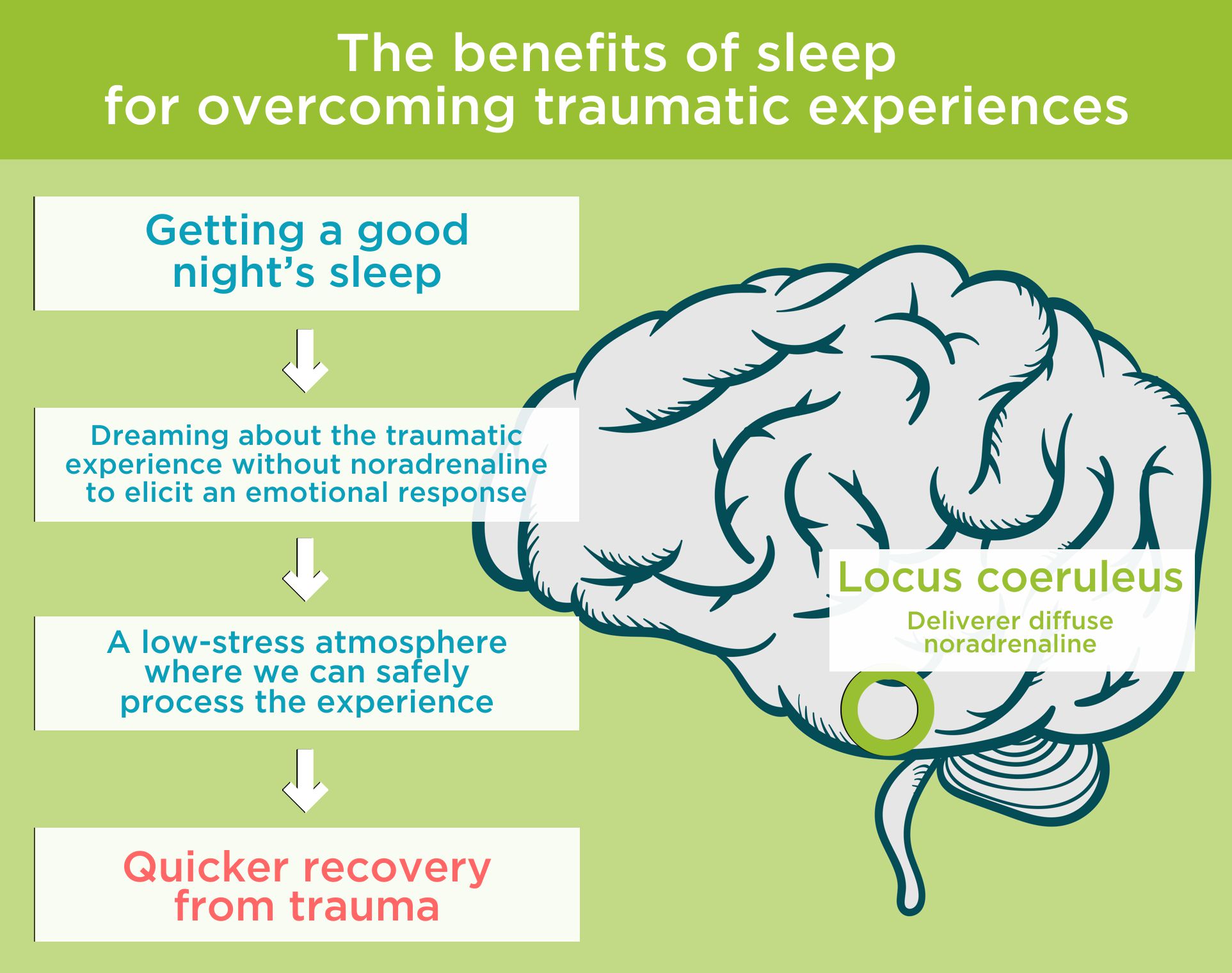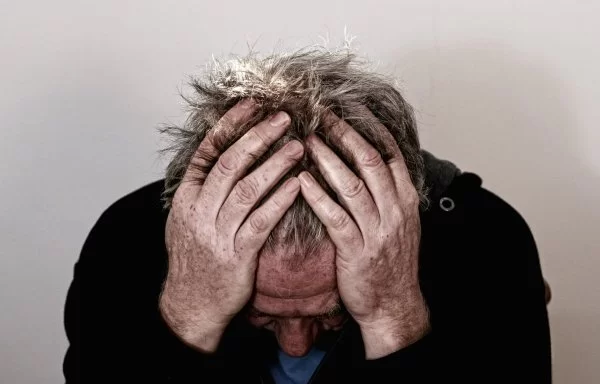Any mother knows that children get cranky, fussy, and irritable when they’re tired. In fact, when young children act out, adults often blame their behavior on their sleep deprivation. “He just needs a nap,” they’ll say.
When teenagers and adults demonstrate irritability and crankiness, on the other hand, their behavior is almost always blamed on something else entirely. They’ll say, “What’s up with him?” or “He must be having a bad day” or “Somebody’s in a bad mood.” They rarely say, “He just needs a nap.” That being said, sleep is just as important for mood, behavior, and emotional stability for adults as it is for children.
In this article, you’ll learn all about sleep and the emotions. You’ll learn what happens in the brain when we sleep and how these processes promote emotional stability. You’ll also learn about the frightening relationship between sleep deprivation and mental illness. After reading this article, waking up on the wrong side of the bed will have a whole new meaning for you.

An emotionally unstable person, on the other hand, is typically highly affected by adversity and subject to intense mood swings. In addition, similarly to a sleep-deprived child, an emotional unstable person often acts impulsively as a result of their heightened emotions.
All in all, emotional stability has a big impact on quality of life and the likelihood of achieving success in all areas of life.
Emotional stability and the amygdala
Much of emotional stability is dependent on the amygdala, a structure in the brain that’s responsible for processing strong, negative emotions like fear, stress, anger, and aggression. In fact, the amygdala is the structure in the brain responsible for our fight-or-flight response – the response that releases stress hormones and prepares the body to fight or run away. [1]https://nba.uth.tmc.edu/neuroscience/m/s4/chapter06.html#:~:text=Amygdala%20is%20the%20integrative%20center,the%20anterior%20of%20the%20hippocampus
When the amygdala is functioning correctly, we only feel these emotions when such emotions benefit us in some way. For example, if we go for a walk and see a bear, it would be beneficial to feel afraid and cautious.
When our amygdala is overactive, however, we feel these emotions more frequently and in times when such emotions are unnecessary. With an overactive amygdala, for example, we may feel strong negative emotions during everyday activities like driving to work or making a phone call [2]https://www.healthline.com/health/stress/amygdala-hijack
An excess of stress hormones and unnecessary fear can lead to emotional instability and cause irritability and crankiness.

Sleep helps regulate the amygdala and emotion
We’ve seen how emotional instability is closely tied to the amygdala. At this point, you may be wondering, “What does this have to do with sleep?”
Well, the last decade, scientists discovered that sleep (REM sleep in particular) is crucial for regulating the stable functioning of the amygdala and, therefore, regulating our emotions [3]https://www.ncbi.nlm.nih.gov/pmc/articles/PMC3237718/.
In a 2013 study [4]https://pubmed.ncbi.nlm.nih.gov/23501052/, scientists set out to investigate the effects of sleep on the amygdala. Individuals were asked to label the emotions of faces on a screen – first after a full night of sleep and then again after being significantly sleep deprived.
The sleep-deprived participants inaccurately labelled a lot more faces as threatening, indicating an overactive amygdala. Furthermore, amygdala activity was directly related to REM sleep. Scientists found that REM sleep, in particular, was responsible for stabilizing the amygdala. [5]https://pubmed.ncbi.nlm.nih.gov/23501052/
The research is clear: Sleep deprivation (particularly REM sleep deprivation) causes an overactive amygdala, which leads to excessive stress, fear, and overall emotional instability.

Sleep helps us to recover from trauma
According to Integrated Listening, trauma is defined as “the response to a deeply distressing or disturbing event that overwhelms an individual’s ability to cope, causes feelings of helplessness, diminishes their sense of self and their ability to feel the full range of emotions and experiences.”
Because trauma can deeply impact emotional stability and daily life. Many people turn to therapy to help them recover from traumatic events. What many people don’t know is that dreaming may be nature’s greatest form of therapy.
In recent years, scientists have found that dreams can help us to recover from emotional trauma and restore our emotional stability. [6]https://www.nicabm.com/sleep-dream/ In 2011, they discovered that during REM sleep, the stress-inducing chemical noradrenaline (also known as norepinephrine) is temporarily shut off in the brain. [7]https://www.ncbi.nlm.nih.gov/pmc/articles/PMC3235734/
Scientists hypothesize that this absence of noradrenaline allows us to dream about traumatic events without the emotional charge we would experience while awake. In other words, our dreams provide us with a low-stress atmosphere where we can safely process our emotions and, as a result, recover faster from trauma. [8]https://www.nicabm.com/sleep-dream/
Sleep expert and PhD, Matthew Walker of UC Berkeley, explained it best: “The dream stage of sleep, based on its unique neurochemical composition, provides us with a form of overnight therapy, a soothing balm that removes the sharp edges from the prior day’s emotional experiences.” [9]https://news.berkeley.edu/2011/11/23/dream-sleep/

Sleep deprivation is linked to mental illness
Since sleep is so beneficial for the emotions and emotional stability, it’s no surprise that sleep deprivation is related to mental illness.
That being said, for years scientists considered sleep problems to be a consequence of mental illness and not the other way around.
Since recent research indicates that sleep deprivation is a major cause of emotional instability, scientists are beginning to rethink their initial theory. It seems that sleep deprivation isn’t just a consequence of mental illness; it may also be a cause.
Here’s what we know so far about the relationship between sleep deprivation and several mental illnesses:
Sleep deprivation can lead to depression
Depression is a mental health disorder characterized by persistently depressed mood or loss of interest in activities, which greatly affects quality of life.
For decades, sleeping problems have been considered merely a consequence of depression. That being said, growing evidence supports the notion that sleep deprivation may actually lead to depression and/or exacerbate existing symptoms. [10]https://pubmed.ncbi.nlm.nih.gov/30734486/
Likewise, recent studies have demonstrated that both pharmacological and nonpharmacological remedies for insomnia may favorably reduce and possibly prevent depression. [11]https://pubmed.ncbi.nlm.nih.gov/19170404/

Sleep deprivation can lead to anxiety
Anxiety is a mental health disorder characterized by feelings of worry, anxiety, or fear that are strong enough to interfere with daily life. Globally, one in 13 people suffers with anxiety. [12]https://www.futurity.org/globally-1-in-13-suffers-from-anxiety/
For decades, scientists have accepted that sleeping problems are a common side effect of anxiety. The monkey mind of anxious people keeps them awake at night. It turns out, however, that sleeping problems aren’t just a result of anxiety; they might also be a cause.
In 2007, scientists discovered that chronic insomnia is actually a risk factor for anxiety, meaning people with chronic insomnia are at higher risk for developing anxiety. Additionally, more recent research from 2013 indicates that poor sleep may actually activate anxiety in people who are at high-risk for it. [13]https://pubmed.ncbi.nlm.nih.gov/23804084/
Sleep deprivation can exacerbate symptoms of bipolar disorder
Bipolar disorder is a mental disorder associated with episodes of mood swings ranging from depressive lows to manic highs.
A growing body of evidence supports the theory that sleeping problems induce or worsen manic and depressive periods. [14]https://pubmed.ncbi.nlm.nih.gov/25750600/ As is the case for depression, recent studies suggest that remedies for insomnia may favorably reduce symptoms of bipolar disorder. [15]https://www.ncbi.nlm.nih.gov/pubmed/25622197

Sleep deprivation can exacerbate symptoms of ADHD
Attention-deficit/hyperactivity Disorder is a chronic condition characterized by attention difficulty, hyperactivity, and impulsiveness. ADHD often begins in childhood and can persist into adulthood, and may contribute to low self-esteem, troubled relationships, and difficulty at school or work.
Similarly to the other mental illnesses mentioned above, scientists are discovering a bidirectional relationship between sleep and ADHD. [16]https://www.ncbi.nlm.nih.gov/pubmed/25127644 That is, in addition to being a consequence of ADHD, sleep deprivation may actually exacerbate symptoms.
Sleep time variation can increase risk of suicide
Finally, given the impact of sleep on the emotions and the relationship between sleep and mental illness, it’s no surprise that chronic sleep deprivation and sleep disturbances has been linked to increased risk of suicide. [17]https://www.ncbi.nlm.nih.gov/pmc/articles/PMC2656315/
What is surprising, however, is that variation in sleep times can increase suicide risk in people who are already at risk of suicide. In a 2017 study [18]https://med.stanford.edu/news/all-news/2017/06/sleep-disturbances-predict-increased-risk-for-suicidal-symptoms.html, researchers at Stanford University of Medicine set out to examine the sleep habits and bevaviors of 50 young adults from 18 to 23 years old who had a history of suicide attempts or thoughts of suicide.
The researchers found that the study participants with inconsistent sleep schedules were the participants who were most likely to experience suicidal symptoms during the study.
Scientists have also studied the relationship between daylight savings time (when we lose an hour of sleep at night) and suicide risk. In one study, Australian suicide data from 1971 to 2001 was assessed to determine the impact on the number of suicides of a 1‐h time shift due to daylight saving. The results confirmed that male suicide rates increased in the weeks following the start of daylight saving [19].
Final thoughts on sleep and the emotions
Emotional stability is an important part of health, happiness, and success. Emotional instability, on the other hand, can lead to PTSD, chronic anxiety, and a long list of other mental illnesses.
Since sleep helps to regulate the amygdala, sleep also helps to regulate and stabilize emotion. Likewise, REM sleep and dreaming helps process emotions and soothe the mind from the emotional experiences the day prior. All-in-all, sleep is essential for maintaining emotional stability.
Furthermore, recent research suggests that sleep and mental illness have a bidirectional relationship, meaning sleep deprivation is not only a common symptom of mental illness but also a common cause. If you want to enjoy emotional stability and the joys of an emotionally stable life, it’s a good idea to prioritize your sleep. If you experience trouble sleeping, you may also want to invest in one or more natural sleep solutions to improve your sleep. The benefits of sleep are certainly worth the investment.
How to improve your sleep
Despite the importance of sleep, especially for athletes and their performance, many athletes don’t get the sleep they need. Elite athletes are often battling jet lag, inconsistent training schedules due to travel, and psychological stress. All of which may have a significant impact on their sleep duration and sleep quality.
Youth athletes also have their fair share of obstacles when it comes to sleep. They often go to bed too late (because they have homework to do or because they’re naturally night owls) and are forced to wake up early for class. For many, excessive screen time (either for work or pleasure) also plays a role in their poor sleep quality.
Fortunately, scientists have found that there are quite a few ways for athletes to improve their sleep. Here are a couple of tips:
- No caffeine after 3:00 PM. Recommendation: Switch to a caffeine free herbal infusion
- No long naps in the afternoon. Recommendation: Cut the naps down to 20 minutes
- No blue light at least an hour before bedtime. Recommendation: If you can’t avoid the screens, try some glasses that block blue light
- No light in your bedroom. Recommendation: Try a sleep mask or blackout curtains
- No noise in your bedroom. Recommendation: Use earplugs, headphones (designed for sleeping), or a white noise machine to block out the distracting noise
- If you’re travelling and suffering from jet lag, try taking a melatonin supplement to regulate your circadian rhythm.
- If you’re too anxious or nervous to sleep, try natural sleep supplements, herbal infusions, or essential oils to help you relax.
One final note for athletes everywhere: Waking up for early-morning workouts is great, as long as you feel well-rested when your alarm goes off. Otherwise, it’s probably more beneficial to hit the snooze button.
Referencias
